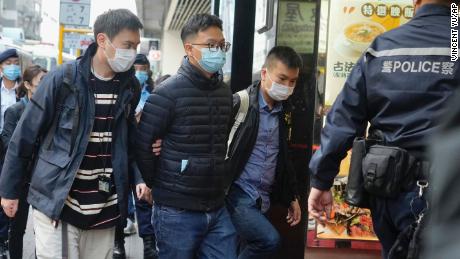Hong Kong (CNN Business)Tough US laws requiring audits for foreign companies. A growing crackdown by Beijing that threatens to touch every part of the Chinese tech industry. A botched public offering by one of China's most prominent tech firms.
Things are looking pretty dire for Chinese tech right now, especially firms that have been considering overseas listings as a way to raise money. The chill created by tensions, both within China's borders and with its greatest rival, could bring overseas investment in Chinese tech to a grinding halt.
Investors are already rattled. China's unprecedented tech crackdown has wiped $1 trillion off the value of overseas-listed Chinese tech stocks since February ŌĆö one of the worst sell-offs in history, Goldman Sachs analysts said in a research report last week.
And since shares in Didi crashed this month after its IPO in New York ŌĆö a result of the massive scrutiny the ride-hailing company has faced from Chinese regulators and American lawmakers ŌĆö a wave of other Chinese firms have reportedly backed off of plans to go public in the United States.
TikTok owner Bytedance, social e-commerce platform Xiaohongshu, fitness app Keep and medical data company LinkDoc Technology have all either shelved or scrapped plans to list in New York, according to reports by Bloomberg, the Wall Street Journal and the Financial Times. (ByteDance declined to comment on those reports, while the rest did not respond to requests for comment.)
More recently, Bloomberg reported that on-demand delivery app Lalamove is thinking about shifting plans for a $1 billion US IPO to Hong Kong as Chinese regulators clamp down on overseas listings. The company told CNN Business that it is "paying close attention to capital markets," but has no specific plan for going public.
It "may very well be" the end ŌĆö at least temporarily ŌĆö to US listings for Chinese companies, according to Doug Guthrie, a professor and director of China Initiatives at Arizona State University's Thunderbird School of Global Management. He added that a "serious pause" on such listings could be in effect until US-China relations improve.
"The Chinese government is sending a very clear signal to Chinese tech firms and to the rest of the world, that Chinese organizations must work in lock-step with the Chinese government," Guthrie said. "Companies that have grown too big and global too quickly will be reined in to ensure that they are working together with the Chinese government's priorities. "
US listings have long been an important way for Chinese companies to raise foreign capital. Despite tensions between the two countries, Chinese firms still raised about $13.6 billion from US listings last year, the best annual total since 2014 when Alibaba (BABA) went public in a $25 billion New York IPO, according to data provider Dealogic. 2021 was also shaping up to be a bumper year before Didi's IPO.
There are still ways for Chinese companies to tap overseas investment even if the United States is no longer an option. They can go to Hong Kong, for example, which also has a diverse pool of international investors and a regulatory regime that meets international standards and allows free flow of capital and information.
But the US market still has an irreplaceable role, as it's bigger than any other financial market in the world, has a greater turnover in stocks and places a higher value on company earnings. That means a company listing in the United States may find it easier to achieve a higher valuation and sell more shares
Pressure from both sides
Beijing's sweeping tech crackdown has rocked firms from Alibaba and Ant Group to Meituan and Pinduoduo. And its efforts to control the sector spread even further this month.
The Cyberspace Administration of China ŌĆö a powerful internet watchdog with Chinese Community Party links that trace all the way up to President Xi Jinping ŌĆö banned Didi from app stores days after its initial public offering.
The CAC, which has accused Didi of illegally collecting and using personal information, also joined several other government agencies, including ministries in charge of public and state security, in visiting the Beijing-based company to review its cybersecurity.
The watchdog, whose influence has ballooned since Xi set the agency up in 2014, is also setting its sights on curtailing overseas listings. It recently proposed that any company with data on more than one million users must seek the agency's approval before listing its shares overseas.
"Financial officials previously tolerated their loss of regulatory control with overseas listings in order to provide firms with more opportunities to raise capital," analysts at Eurasia Group wrote in a report earlier this month. "But the overall calculus has clearly shifted in favor of prioritizing national security concerns."
It's not just China that's turning up the heat. Late last year, former President Donald Trump signed into law new rules that require US-listed companies to share audits with American regulators or risk being delisted. The law also requires those firms to disclose whether they are owned or controlled by a foreign government.
American lawmakers and investors have called on the US Securities and Exchange Commission to investigate Didi's IPO fiasco, which the Eurasia Group analysts said "will at the very least intensify political pressure" on the US regulator to enforce the new audit law.
"There is also a very real possibility that the US moves to restrict new listings by Chinese firms," the analysts said, suggesting that such an action could come from either the SEC or Congress.
A tenuous financial relationship
Tensions between the United States and China have intensified in recent years over issues ranging from tech and trade to Covid-19, Hong Kong and Xinjiang.
But even as Washington blacklists Chinese companies and bars them from accessing US technology or investment, money has still been flowing into China.
So far this year, 37 Chinese companies have listed in the United States, raising a combined $12.6 billion, according to Dealogic. That's the highest amount for the period on record since 1995.
US investors now hold about $1 trillion in Chinese stocks. That includes about $590 billion worth of exposure in Hong Kong, $330 billion in the United States, and $135 billion in mainland China, according to a recent estimate by Goldman Sachs.
Beijing's recent clampdown and the tensions with Washington, though, have already lead to a shift.
"Irrespective of the politics, US and Chinese regulators are now demanding higher transparency and more accountability from Chinese [American Depositary Receipts]," said Qi Wang, CEO of MegaTrust Investment (Hong Kong), a Chinese fund management firm.
"Companies may face two sets of different or even opposing standards," he said, referring to regulatory demands in each country. "The legal and compliance challenges [of Chinese IPOs] will only increase from here."
Global mutual funds are underweight on Chinese equities, according to the Goldman Sachs analysts, who added that hedge funds have also reduced their exposure to Chinese stocks to the lightest in two years.
But the analysts also believe that Chinese authorities probably will temper their crackdown, at least enough to avoid jeopardizing the most important sector to China's innovation ecosystem, hopes for international influence and status, and the wider economy.
Goldman estimated that China's digital economy accounts for 40% of the country's GDP, and that the tech sector represented some 40% of the MSCI China Index, which is widely followed by global equity investors as a major benchmark.




















